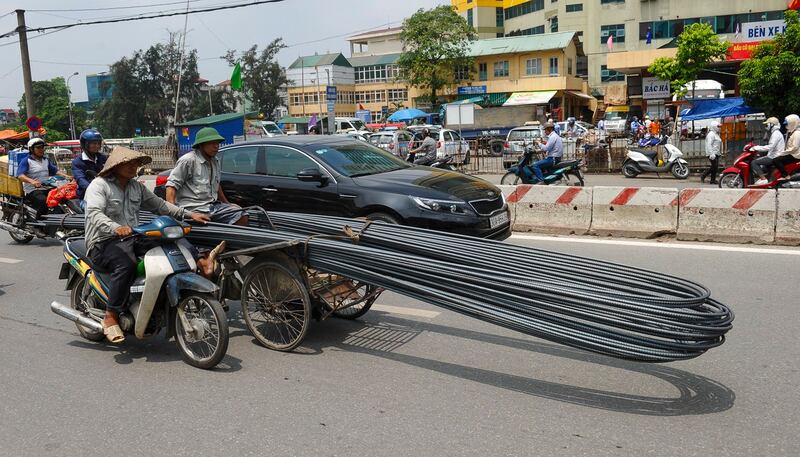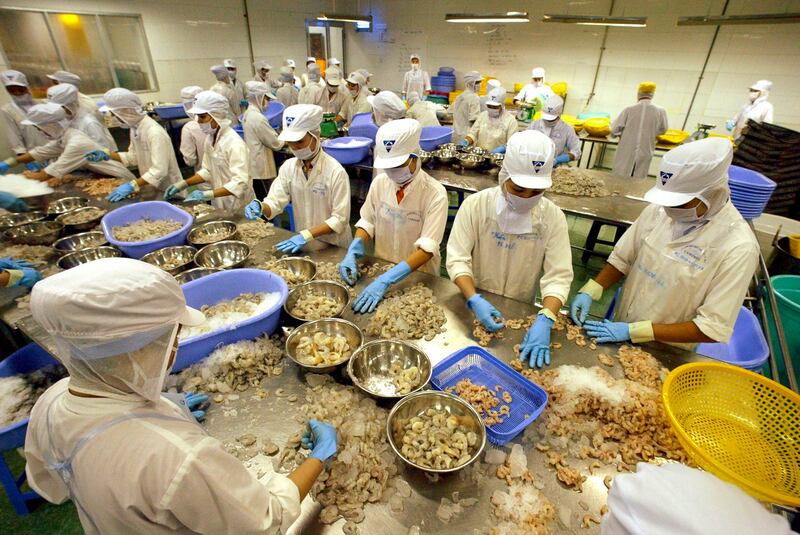In recent years, Washington has been rightly accused of overlooking the more troubling aspects of Vietnam – the marked decline in human rights since 2016 and its vast trade surplus with the U.S., for instance – because of the country’s strategic and economic importance.
One of the fastest-growing economies in Asia, Vietnam has steadily captured a niche for high-end tech manufacturing, making it a useful partner in the U.S.-led push for decoupling from China.
But this positive view hasn’t pervaded all of Washington.
On Aug. 2, the U.S. Commerce Department announced that it would not reclassify Vietnam as a “market economy.” It was a major blow to Hanoi to be declared still a “non-market economy.” For years, the Vietnamese government had sought to rid itself of this status. Many other countries, such as Australia, Japan, and Canada, have already reclassified Vietnam as a “market economy,” a legal status that defines how they calculate anti-dumping duties on imports.
Vietnam has spent millions of dollars in recent years lobbying Washington to change its mind, too. It made a formal submission to the U.S. Commerce Department last September, the same month that U.S. President Joe Biden visited Hanoi to upgrade ties to a “Comprehensive Strategic Partnership.” After that upgrade, disposing of Vietnam’s “non-market economy” status was the next milestone in U.S.-Vietnam relations. After all, only 12 other countries, including Russia, China, and North Korea, still suffer that classification.
Everything’s fine
Vietnam was “disappointed” by the decision, it said.
But, privately, the mood in Hanoi is probably darker than that. Elevation from “non-market status” would have been a diplomatic boon for Vietnam, and a sign of respect from Washington that it could parade around as it tries to build a bigger international footing.

“Market economy” status would have been a boon for Vietnam’s economy, too, easing tariffs and concerns of investors, who may now take their money somewhere with better trade ties to America.
It might also have steadied Hanoi’s tremors about the prospect of Donald Trump returning to the White House. To put it nicely, Vietnam was ingratiating during the first years of the Trump administration.
Its prime minister at the time was one of the first world leaders to congratulate Trump and speak to him after his victory. Hanoi lobbied hard to host Trump’s wasteful meeting with North Korean dictator Kim Jung Un in 2018. But then relations soured. In 2019, Trump called Vietnam the “worst abuser” of U.S. trade – worse even than China.
Trump also railed against Vietnam’s vast trade surplus, and his U.S. trade representative classified Vietnam a trade manipulator in 2021.
Biden reset
The Biden administration ruled there was “insufficient evidence” to classify Vietnam as a currency manipulator. It has been mute over America’s massive trade deficit with Vietnam, which has increased from US$55 billion in 2019 to US$104 billion in 2023, making it one of the highest of any country, according to U.S. government data.
Washington has also been quiet about Vietnam allowing itself to be used by Chinese companies to evade U.S. tariffs. Some analysts have suggested links between the increased value of Vietnamese exports to the United States and the increased value of Vietnamese imports from China, leading to accusations that Chinese companies are rerouting high-tariffed goods through Vietnam to the United States.

Still, “market economy” status would have been the ideal parting gift from the Biden camp to shore up ties with Washington and Hanoi.
Another Trump administration next year could reverse the decision, but that would have required more effort than Trump is likely to exert and probably would not be near the top of his policy agenda.
Strategically, not doing so wasn’t Washington’s smartest move. Washington has overlooked much about Vietnam – the massive trade deficit, helping China circumvent tariffs, its dire human rights situation, and one-party rule. What’s one more thing to ignore?
A strategic mistake?
Awarding “market status” would have made Vietnam ever more dependent on American importers. It would also have won approval within the Communist Party circles. It would have silenced the voices in Hanoi who claim America’s leadership has turned protectionist and is now an enemy of free trade (and China the champion).
More to the point, attempts by Washington to convince international firms to de-couple from China require that they relocate their supply chains elsewhere, potentially Vietnam. While Vietnam already boasts numerous advantages over China – lower wages, better demographics, and fewer geopolitical tensions – having “market economy” status would have made it an even more attractive destination for U.S. companies divesting from China.

Furthermore, the Commerce Department’s announcement couldn’t have come at a worse moment. Late last month, the long-ruling general secretary of the Vietnamese Communist Party, Nguyen Phu Trong, passed away. No liberal and certainly no friend of the West, Trong had balanced Vietnam’s ties between the United States and China.
When a new pact was signed with one, a new pact was quickly signed with the other; when Biden visited Hanoi last year, Chinese President Xi Jinping arrived a month later. And despite his ideological eccentricities, Trong knew Vietnam needed to appease and rebuff Washington in equal measures. He was the first party chief to make a formal visit to the White House. When foreign leaders visited Hanoi, they increasingly met with him. He was the one who stood next to Biden last September to upgrade relations with the United States.
To Lam
Trong’s successor, To Lam, was formally appointed party chief on Aug. 3, the day after the Commerce Department’s announcement. He is an unknown in foreign policy. He lacks Trong’s foreign policy experience, but so did Trong before he became party chief in 2012.
However, To Lam spent his entire career in the public security ministry, a department notorious for thinking that the United States still plots regime change. He was responsible for the recent deterioration in human rights. The anti-corruption campaign he mastered has purged much of the foreign ministry, including high-ranking, Western-leaning officials. He makes for an unlikely friend for Washington – and U.S. State Department officials don’t know what to make of him, I hear.
As I’ve written in this column previously, To Lam has all the hallmarks of a dictator in waiting – and Trong’s campaign to clean the party of corruption and vice has gifted him an institution ripe for one-man rule.

To Lam is visiting Beijing this week, his first official visit abroad since becoming party chief. Nobody seriously expected his first state visit to be to Washington, and he already visited Cambodia and Laos, Vietnam's fraternal neighbors, earlier this year after becoming state president. So one shouldn't read too much into this.
Indeed, To Lam vows continuity in foreign affairs, which will likely be the case. The Vietnamese government has no other option than its “bamboo diplomacy,” in which it seeks to maintain friendly relations with all nations, especially the United States and China.
The United States remains, by far, Vietnam’s largest export partner – and China, by far, the largest import partner. Hanoi requires U.S. support as tensions with Beijing heighten in the South China Sea, yet Hanoi has no interest in tensions leading to conflict.
So the status quo will persist for as long as Hanoi has no alternatives. Being awarded “market economy” status would have helped Vietnam continue with this status quo. Whether that would have been morally or legally the correct decision is another matter.
